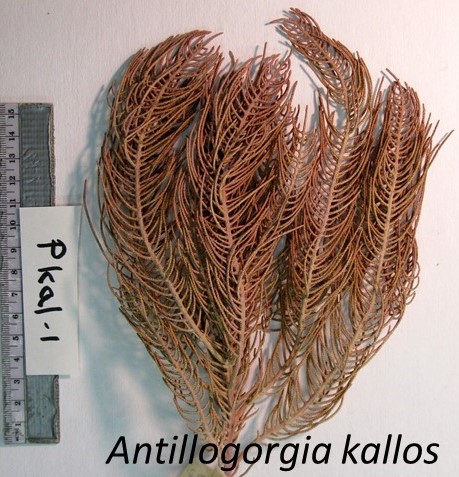
Family: Gorgoniidae
Common Name(s): Beauty sea plume
Colony Form: Pinnate, plumose, <1 m tall.
Axis: Cylindrical
Branches: cylindrical, short and thin, usually 2.5-4.0 cm long (to 7.0 cm), crowded and not usually paired, <4.0 mm apart, arising at an angle toward branch tip of 45º or less, and not strictly in one plane.
Apertures: Flush; no calices; polyps arranged in multiple series on each side of pinnule, separated by narrow naked tract on front and back.
Mucus: None
Color: Dries yellow to grayish brown with purple tinge.
Sclerites: Polyp armature: narrow slender rods with enlarged tuberculate ends, to 0.08 mm long. Body wall: scaphoids (curved sclerites) with transverse ornamentation on convex side developed as continuous collar-like ridges rather than individual tubercles, to 0.14 mm long; narrow spindles to 0.16 mm long.
Habitat: On reefs; depth range unknown.
Distribution: South Florida, Cuba.
Notes: Similar to A. elisabethae, but with pinnules thinner, more crowded, oriented at an angle toward branch tip and not strictly in one plane. Williams and Chen (2012) transferred all Western Atlantic species of Pseudopterogorgia to the genus Antillogorgia.
References: Bayer (1961), Cairns (1977), Sanchez & Wirshing (2005), Williams and Chen (2012).
Similar Species: Antillogorgia bipinnata; Antillogorgia elizabethae



